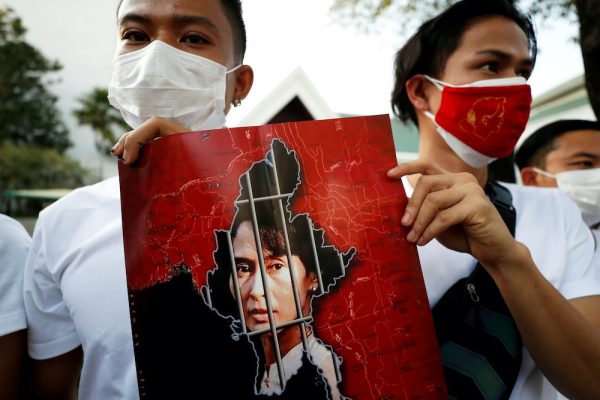How events play out in coming days will determine whether Myanmar returns to its former pariah status under military rule, or if international partners can coax the military to come to a negotiated settlement.
Myanmar’s Lower house of parliament (Pyithu Hluttaw) was preparing to convene Monday, with the upper house (Amyotha Hluttaw) to follow on Tuesday. Despite promises that the military would ‘respect the constitution’ — alleviating fears that it would dispute last November’s election results — the armed forces rounded up civilian leaders and potential opposition organisers in a crackdown reminiscent of Myanmar’s past dictatorship.
After several hours of silence, Myanmar’s military television Myawaddy announced that the military had declared a state of emergency and that Vice President Myint Swe would serve as interim president. Myawaddy further claimed that Myint Swe had transferred all political powers to the Commander-in-Chief Min Aung Hlaing for one year.
The White House was quick to object to the events. White House Spokesperson Jen Psaki said in a statement that ‘the United States is alarmed by reports that the Burmese military has taken steps to undermine the country’s democratic transition’. The statement continued, ‘the United States opposes any attempt to alter the outcome of recent elections or impede Myanmar’s democratic transition, and will take action against those responsible if these steps are not reversed’.
US Secretary of State Antony Blinken called on the Myanmar military ‘to release all government officials and civil society leaders and respect the will of the people of Burma as expressed in democratic elections on November 8’. Other foreign governments similarly voiced alarm at the military’s actions. Australian Foreign Minister Marise Payne called on military leaders ‘to respect the rule of law, to resolve disputes through lawful mechanisms and to release immediately all civilian leaders and others who have been detained unlawfully’.
Even India, which typically refrains from criticising Myanmar’s democratic lapses, noted its concerns. Minister for External Affairs S Jaishankar intoned, ‘we have noted the developments in Myanmar with deep concern. India has always been steadfast in its support to the process of democratic transition in Myanmar. We believe that the rule of law and the democratic process must be upheld’.
A statement from UN Secretary General Antonio Guterres ’strongly’ condemned the detention of civilian political leaders and he expressed his ‘grave concern’ regarding the illegitimate transfer of power. He warned that the ‘developments represent a serious blow to democratic reforms in Myanmar’.
Beyond rhetorical condemnation, the United States is likely to introduce wider economic sanctions against the Myanmar military. It might target the Myanmar military’s business interests, such as Myanmar Economic Holdings Limited (MEHL).
The coup presents an early test for the US Biden administration, which has promised to centre its foreign policy on democracy and human rights. But Biden’s advisors are keenly aware of the competition for influence underway with Beijing. They will be careful not to alienate Southeast Asian countries in their efforts to solicit support for a more confrontational approach towards China.
The White House statement indicated that the Biden administration would work ‘in coordination with our regional partners [to] urge the military and all other parties to adhere to democratic norms and the rule of law’. The extent of coordination with Asian countries so far is unclear.
Counterparts in ASEAN have been more muted in response. Thailand’s Deputy Prime Minister said that the coup in Myanmar was ‘their internal affair’, in line with ASEAN’s preference for non-interference. But Singapore’s Ministry of Foreign Affairs conveyed ‘grave concern’ and urged all parties to ‘exercise restraint’.
While ASEAN was split on how to respond to events in Myanmar, the Jakarta Post reported that the organisation was preparing a joint statement. Indonesia, whose military wields a powerful influence over civilian politics, issued its own statement calling on ‘all in Myanmar to exercise self-restraint and put forth dialogue in finding solutions to challenges so as not to exacerbate the condition.’ ASEAN will almost certainly fail to mount a univocal response to Myanmar’s generals, given that the regional grouping operates on a consensus basis. With authoritarian stalwarts like Thailand and Cambodia loathe to draw attention to their own domestic repression, this lack of unity spells a weak response to another coup in Myanmar.
Beijing has hedged its bets by expressing hope that all sides can manage their differences to uphold stability, though Chinese leaders are likely frustrated by the military’s return to power since they had invested heavily in Aung San Suu Kyi’s civilian government in recent years. Ultimately, foreign governments hold little leverage over the generals in Naypyidaw, who may return — however grudgingly — to their old patrons in Beijing.
International leaders will be watching closely to see if the generals signal any room for negotiation or if they intend to rule with an iron fist like Myanmar’s past military juntas prior to 2010.
The Biden administration in particular will be watchful for any flexibility before resorting to broader economic sanctions against the military, though it is likely considering targeted sanctions in line with US legislation and pressure from lawmakers in Congress. There is a chance, however, that western governments will refrain from isolating Naypyidaw for fear it will draw closer to Beijing’s sphere of influence, an outcome the people of Myanmar are unlikely to accept willingly.
Hunter Marston is a PhD candidate in International Relations at the Coral Bell School of Asia Pacific Affairs, the Australian National University.
This article is part of the Supporting the Rules-Based Order in Southeast Asia project. This project is run by the Department of Political and Social Change at the Australian National University and funded by the Australian Department of Foreign Affairs and Trade. The opinions expressed here are the author’s own and are not meant to represent those of the ANU or DFAT.

